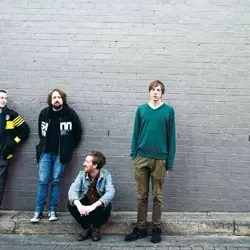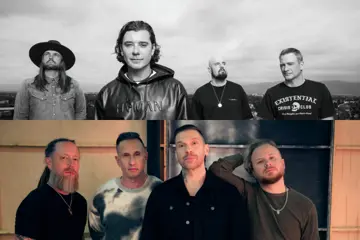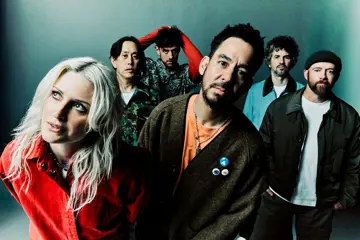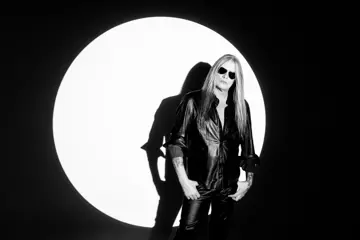 The Laurels
The Laurels"I went a bit nuts, we all went a bit crazy in the studio working on these songs," says O'Farrell, describing the long and intensive process of writing and recording Sonicology. They set up their own studio and "started getting samplers and experimenting with junk shop records, sampling them and making beats" before spending numerous hours recording and sampling themselves to avoid copyright issues. "It is very much a studio album. The guitar took a back seat on this album. If anything samplers were the main instrument. Even the guitars were fed into samplers and triggered and sequenced. It still sounds like us and is guitar heavy, but the way we approached the recording was completely different to what we'd done before," explains O'Farrell.
The genesis of the new album reaches right back to before the band started recording their previous record. "With Plains, we were playing those songs for six years before recording them and then you have to play them on the road for another two or three years. We really adjusted to that way of working as a live band. With this one we started getting into hip hop influences just before we started recording Plains - a lot of Public Enemy, a lot of funk and soul, stuff like James Brown. That was the headspace we were in after the Plains tour finished and then it was a matter of convincing the other guys to try something really different in the studio this time around."
"It was very sad to see Kate go after that amount of time. We're still mates and we still love her."
Between albums, drummer Kate Wilson (The Holy Soul) decided to leave the band and Jasper Fenton, who O'Farrell and Piers Cornelius had played with in other groups, was drafted in. "It wasn't easy, it was very sad to see Kate go after that amount of time. We're still mates and we still love her. With the new tracks and the way we wanted to approach them in the studio, that wasn't what she wanted to do with the band. Jasper is also a multi-instrumentalist and a producer which really helped the recording," says O'Farrell.
One hurdle to overcome after making an album steeped in studio production and different technology is how to present the songs live. O'Farrell explains that they've got their head around the songs now. "It's taken us a few months going back and re-learning and adjusting songs. Their entire life has been in the studio, they weren't really made for live performance but we've figured out a way to represent them live. There are three of us triggering samplers now but we're not tethered to a click track, we want to still keep it loose and free and incorporate the samples from the album."
Don't miss a beat with our FREE daily newsletter
"This album was more collaborative than anything we've done in the past," says O'Farrell, when asked if the band is a collective vision or driven by one or two people. "There's never really been a leader, we all have ideas 'bout how we want the band to sound and we try to incorporate everyone's vision. It's a mix of all of us and I guess that's why we are still together after ten years."















